"Butler," A Book Review
Salena Zito is America's last genuine journalist, and her book is about much more than her front-row seat at the attempted assassination of Donald Trump.
Listening to Salena Zito’s new book on audio during a drive last week between Northern Virginia and central Illinois, I was struck by how similarly we see her craft - my former craft - of journalism, Donald Trump, and the 2024 election. However, she had a front row seat and has earned her status as the preeminent journalist on All Things Trump.
Every presidential election, dating back to at least Theodore White's coverage in 1960, has its preeminent journalist who has had remarkable inside access and insightful observations into the winning campaign. White wrote the definitive books on presidential elections for more than a decade. Jules Witcover and Jack Germond collaborated on several books during the 1970s and early 1980s. Bob Woodward, of Watergate fame, stepped up during the 90s and through the Obama years.
Salena Zito has now emerged as the preeminent journalist with the best relationship, access, and understanding of President Donald Trump. But while White, Witcover, Germond, and Woodward were venerated inside DC’s beltway and often sought by Sunday talk shows, Zito is largely ignored by the legacy media. Which is too bad, because they could learn a lot by seeking her observations and insights. She understands and grasps politics and trends in America better than anyone inside the beltway.
Unlike Salena, I gave up journalism to pursue a career in politics and government. I had been a news reporter and correspondent for 12 newspapers owned by the Donrey Media Group at the Oklahoma State Capitol. I later served as Editor of the Henryetta Daily Free-Lance before transitioning into political campaign work in 1978. Salena, 65, eventually stuck with Journalism and succeeded. Today, she writes for several national publications, including the Washington Examiner and New York Post, among others.
She’s built her “brand” on traversing rural communities in Appalachia, and much of the Midwest and South, staying off interstates and finding human interest stories among small towns like Warren, Ohio, and of course, Butler, Pennsylvania. Her stories, as well as her new book, feature everyday Americans more than political or media luminaries. Zito proudly differentiates herself from the usual political reporting that emanates mainly from the Acela corridor (Washington-New York) bubble. She and co-author Brad Todd wrote the definitive book on the 2016 presidential campaign, “The Great Revolt,” where she was among the first to capture the political party realignment that is well underway among the American electorate.
I first met Salena - the only time we’ve interacted in person - during former Sen. Rick Santorum’s second presidential campaign launch in Butler, Pennsylvania, on the same day as my wife’s and my wedding anniversary in 2015. The fetching Mrs. Johnston was a volunteer in Santorum’s campaign and led the former Pennsylvania senator’s grassroots effort, Patriot Voices, in the Keystone State. Spending our anniversary at Santorum’s announcement near Pittsburgh was her idea. She even roped our youngest son, then a rising Senior at Elon University, into service.
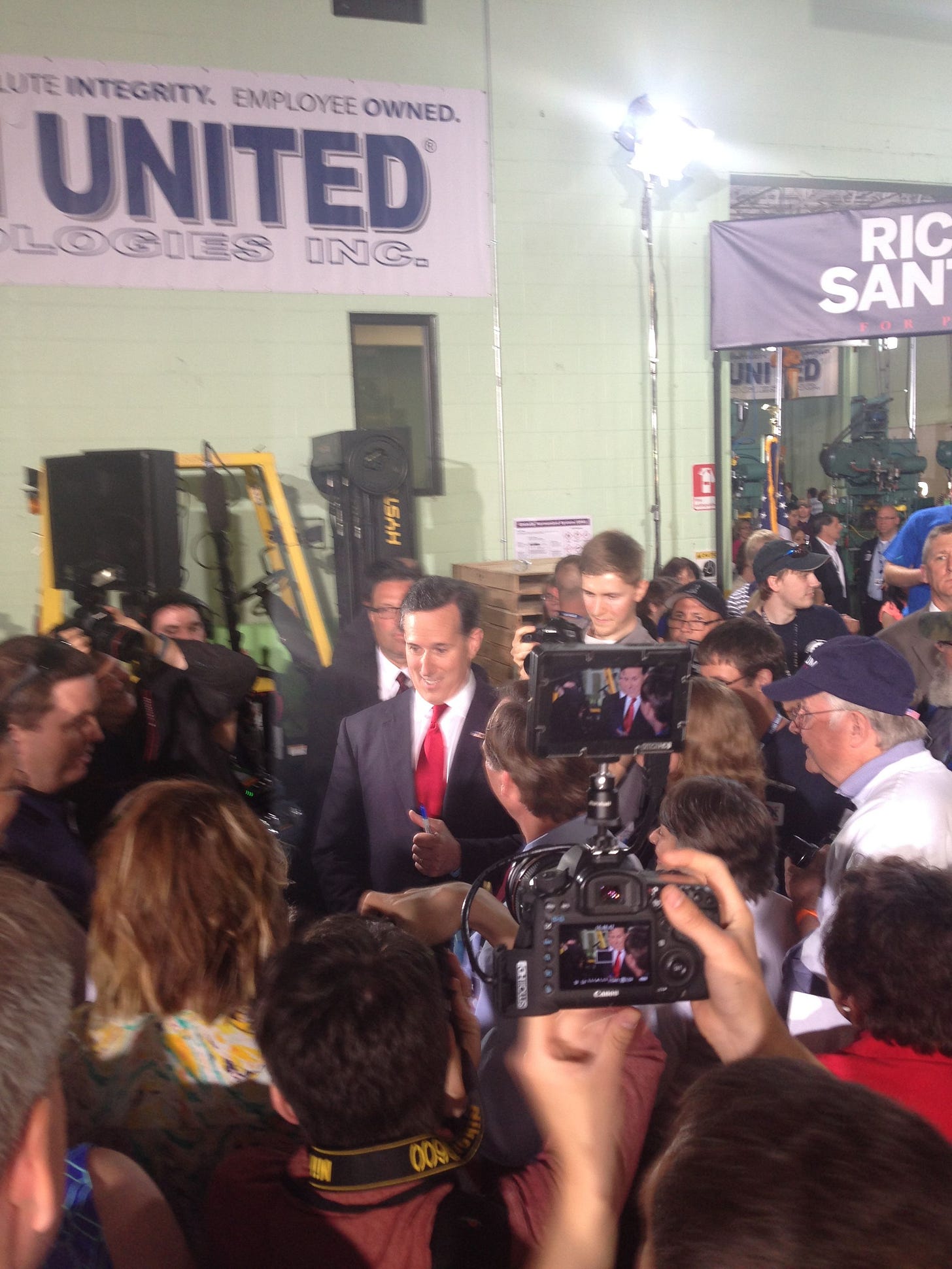
My wife and son staffed the media check-in table just inside Penn United Technologies, a manufacturing company. My job was to guide the reporters just inside the factory to their designated area for Santorum’s announcement.
Salena, then a reporter with the Pittsburgh Post-Gazette and, very briefly, a former aide to Santorum, made her presence known.
Side note: Many famous journalists have worked on Capitol Hill or in partisan political campaigns. Jake Tapper, a Philadelphia native and now at CNN, worked for former U.S. Rep. Marjorie Margolies Mezvinsky (D-PA), who served one term (1993-1995) before losing reelection to Jon Fox. NBC’s Chuck Todd, the former host of NBC’s Meet the Press, worked on US Senator Tom Harkin’s (D-IA) 1992 failed presidential campaign. There’s nothing inherently wrong with that, so long as they don’t carry their partisan biases into their media professions (Todd and Tapper did).
The first thing you notice about Salena is her hair. It’s big and a bit unruly. Whenever my wife lets her long Hispanic hair go on a humid summer day in Virginia, I start calling her “Salena.” My wife shares the same birthdate as Salena Zito.
As she waltzed by on that sunny day in 2015, she stopped, brusquely asked me a question that I couldn't answer, and then wheeled around to head to the press area. I don’t recall if she was wearing her famous cowboy boots that warm and muggy Spring day. “That’s Salena Zito,” someone on the campaign staff whispered to me. She was already a local legend, and as she outlines in her latest book, “Butler,” her roots run deep in the region, including western Pennsylvania and eastern Ohio. There was a distinct “no bullsh*t” attitude about her, a familiar trait of veteran political reporters.
From her attitude that morning, she wasn’t there to give Santorum a “free ride.” She’s always taken her journalist responsibility seriously, and that’s evident from her newest book.
Zito begins “Butler” not with that fateful day, July 13, 2024, one of the four game-changing events (East Palenstine, the Trump-Biden debate, the RFK jr. endorsement of Trump, and Biden’s withdrawal for Kamala Harris) that summer leading up to the November elections, but with another “assassination” attempt of a future president not far from there. It was about a young British military officer named George Washington, dispatched to the frontier of western Pennsylvania with a message from King George II for the French to leave their land.
Washington was not victorious, and on the way back, narrowly missed being sabotaged by one of his Indian guides, but only after narrowly missing a sniper’s bullet on December 26, 1753. It’s a great history lesson, and a visit to Fort Necessity southeast of Pittsburgh is a must when traveling US 40, the “Washington Trail,” from I-68 in West Virginia towards I-70. There are famous hotels nearby (Nemocolin, The Summit Inn, etc.), along with caverns and a popular lake.
She titles her introduction, “They Shoot Presidents in Butler.” She later recounted Washington’s near miss to Trump after his own experience on stage, a bullet from Matthew Crooks, one of eight shot at him that day, that grazed his ear and came an inch of taking his life were it not for the use of a chart on immigration from US Sen. Ron Johnson (R-WI) that led Trump to turn his head just enough, at just the right time. Hence, the bullet grazed his ear and didn’t implant itself into his skull.
Chapter One begins with the four shots she heard as she sat four feet away behind the podium. She describes how she went immediately into reporter mode. I remember that feeling when things seem to slow down around you as you chronicle every detail. She does that expertly, down to minute details about Trump trying to get his shoes back on after they were knocked off by Secret Service agents rushing to the stage as the bullets whizzed by.
She also jokes about how Donald Trump comments on her hair every time he sees her. “Doesn’t she have the best hair in journalism?” she quotes Trump as saying. She was embarrassed by Trump’s comments as someone who doesn’t like the attention - another trait of a real journalist.
As a reporter, I was never directly fired at. Still, in 1977, I was invited to accompany the Oklahoma Highway Patrol on a manhunt for three escaped prisoners from the state penitentiary in the hollows around Dewar, Oklahoma, a remote former coal mining area in rural Okmulgee County. I doubt they would do that today. We found a dead body, one of the prisoners shot in a make-shift bed in a shanty by the other escapees as they continued. I wasn’t just a reporter, but the official photographer for law enforcement. We had a deal - I got my story, and they got my black-and-white photos after I developed them in my darkroom. Lots of small-town journalists operate that way, and I see no problem with it.
It’s amazing what happens to a dead body left out in the summer Oklahoma heat. I’ll leave it to your imagination. The details of that manhunt remain fresh in my mind after all these years.
I was often called upon to photograph such events, including covering fatal car crashes, because I wouldn’t get sick - the events didn’t faze me. I somehow managed to detach myself from the carnage coolly and did my job without getting emotional or ill. I have no idea how I developed that skill since I never served in the military. It’s just a trait - you have it or you don’t. I credit, in part, my first-aid emergency services training as a Civil Air Patrol cadet, which was pretty graphic as memory serves. After all, we were trained to rescue victims of airplane crashes. It’s not for the faint of heart.
Salena no doubt has the same skill. While she’s not too graphic, you know she saw a great deal of it at the Butler assassination attempt. She writes with great respect and candor about Cory Compertore, the Butler firefighter who sacrificed his life by sheltering his wife and daughters from the bullets that rained towards Trump. Two more rally attendees were seriously wounded but survived.
But Salena’s book is about much more than the events in Butler that fateful July 23rd in 2024. It dissects and analyzes the campaign events that followed, complete with an excoriating critique of what’s left of her profession, and it’s complete failure to understand or capture the trends she’s seen for a decade, if not longer.
While most books that focus on the 2024 election deal with the Biden and Harris campaigns, Salena embedded herself within Trump’s. No surprise there, since the Washington-NY media axis was all in on covering up for Joe Biden’s obvious (to us, anyway) infirmities, and tracking if not cheering for Kamala Harris as she ascended, without a convention vote or opposition, as the new Democratic presidential nominee. Books like Jonathan Allen’s “Fight” or Jake Tapper’s and Alex Thompson’s “Original Sin” dissect the drama and failures of the Biden and Harris campaigns, but never bothered to embed themselves with the Trump campaign for a complete look or analysis. The Trump campaign also didn’t trust them, and I get that. Neither would I.
The Tapper and Allen books are fine, but without the benefit of “Butler,” you don’t get the full story of the 2024 campaign. Salena correctly notes that the first significant event of the campaign wasn’t Butler's appearance or even the Trump-Biden debate a month earlier. It was Biden’s failure to show any interest in the devastating train crash in East Palestine (Pala STEEN), Ohio. Trump showed up with food and water, wearing waders as he inspected the damage. Then-US Senator and future vice presidential nominee JD Vance returned frequently to keep attention on the Biden Administration’s disinterest.
Note for Salena: The professional reader of her book mispronounces “East Palestine” repeatedly.
It signaled, again, that the Biden Administration was uninterested in the plight of working-class communities. Zito details it all in her book.
Zito’s final chapter 12 focuses on the “reckoning” that is long overdue with the media. Even Jack Tapper admitted as much, while still blaming Democrats around Joe Biden, in a recent interview with radio talk show host Hugh Hewitt. Tapper and his ilk remain clueless and unrepentant.
Why read Salena’s book? First, it is the best, most thorough, and straightforward account of events at Butler on that fateful day. Second, she captures and analyses the impact of several key events. Third, she’s the only reporter who successfully embedded herself in the Trump campaign to capture their key moments and actions. Fourth, she grasps the appeal of Donald Trump, which has led to a realignment in American politics.
Salena, who also teaches journalism at Hillsdale University’s Kirby Center in Washington, D.C., offers excellent advice for young people who aspire to be journalists. Get out of Washington, work for a local newspaper, and cover the police beat and the local school board. Get where people live. She’s spot on.
Salena’s book earned a top spot on the New York Times bestseller list. She’s earned it. Chances are you’ve obtained the book, whether in audiobook or Kindle format (as I have) or a hard copy. Now, you just need to read it. By doing so, you’ll understand the events of 2024 and their consequences better than you’ll get from any other source. Don’t waste your time on the other gossipy books about the 2024 election, especially Tapper’s.
And you’ll grasp what a real journalist looks and acts like. Five stars.




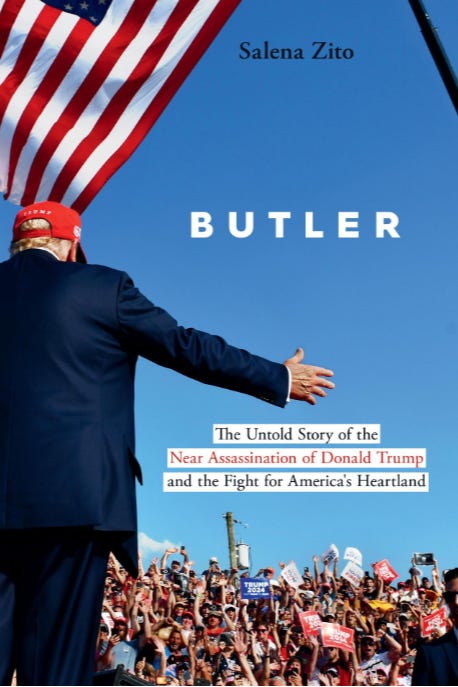
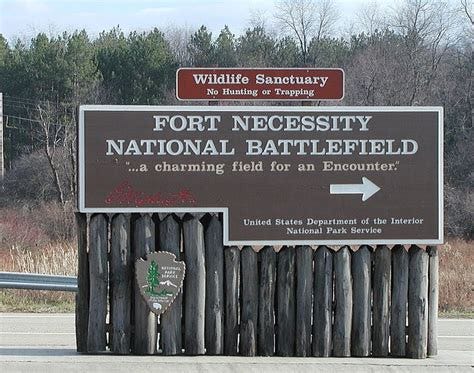
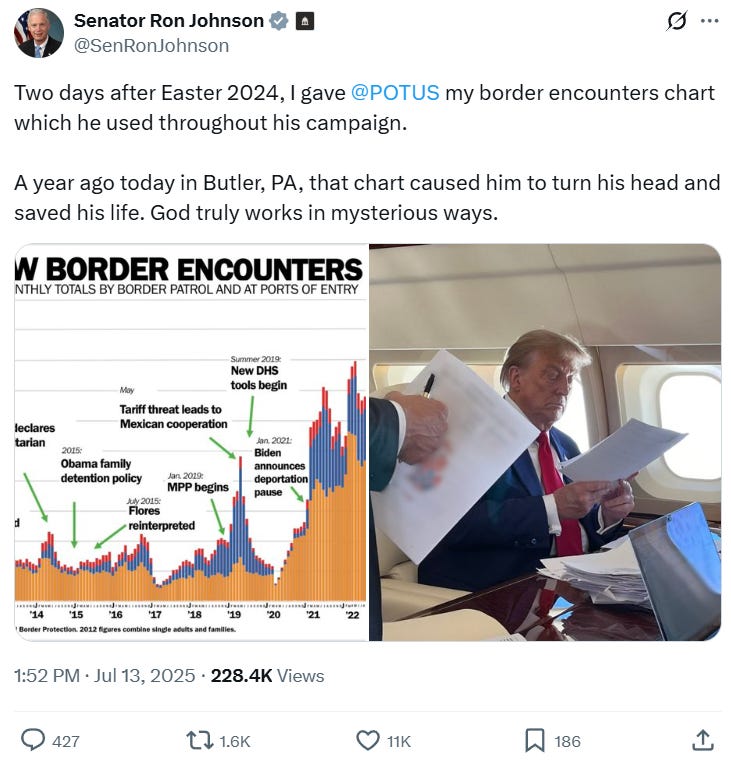
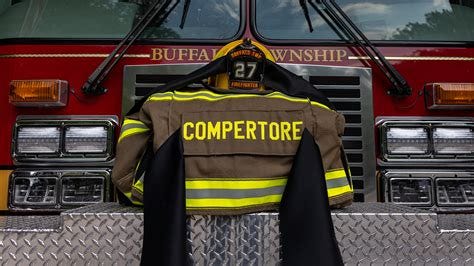
Sounds like an excellent read, looking forward to it.
Interesting reporting